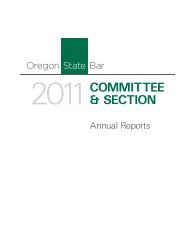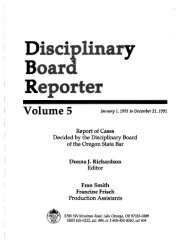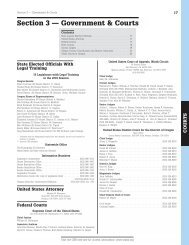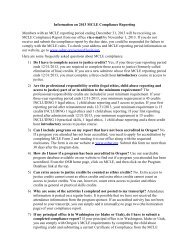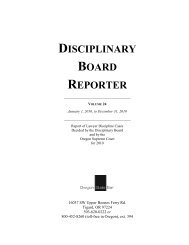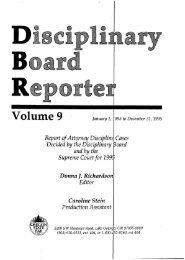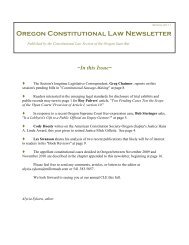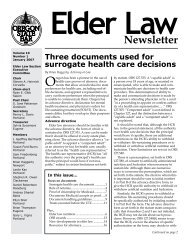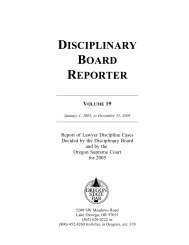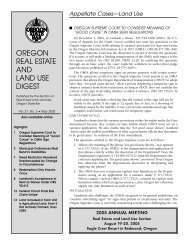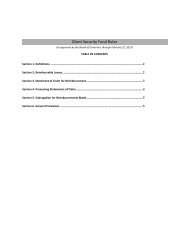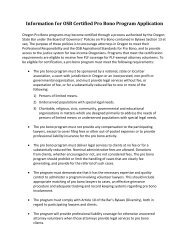February 22, 2013 - Oregon State Bar
February 22, 2013 - Oregon State Bar
February 22, 2013 - Oregon State Bar
Create successful ePaper yourself
Turn your PDF publications into a flip-book with our unique Google optimized e-Paper software.
attempts to keep members of the public ignorant of their potential rights are not proper<br />
purposes for such limitations.<br />
The Majority also believes, however, that the present prohibitions involving duress<br />
or harassment and prohibitions against further contacts of individuals who have made<br />
known a desire not to be contacted are appropriate and should be continued.<br />
The Proposed Rules focus much more clearly on the need for lawyer advertising<br />
and solicitation to be truthful and not misleading. Thus, the “laundry list” of specific<br />
prohibitions contained in Current RPC 7.1(a) has been eliminated due to an overlapping<br />
series of concerns about whether the list as written supported this objective or was even<br />
helpful to attorneys. The Majority believes that this list should be replaced by an<br />
extended <strong>Bar</strong>-sponsored commentary which will, among other things, allow a more<br />
nuanced assessment of advertising and solicitation issues than is possible within the<br />
limits of black-letter RPCs.<br />
The Majority believes that Article I, Section 8 of the <strong>Oregon</strong> Constitution prevents<br />
the blanket prohibition against in-person or real-time electronic solicitation of clients by<br />
lawyers or their agents or employees that is presently contained in RPC 7.3. The Majority<br />
also believes that this blanket unduly restricts much behavior that is entirely appropriate<br />
and in the public interest.<br />
The Majority considered whether the blanket prohibition on in-person or realtime<br />
electronic solicitation of clients should be wholly abandoned or, perhaps, retained<br />
solely as to personal injury, wrongful death and consumer matters, as distinct from<br />
business matters. Although the Majority concluded that the blanket prohibition should<br />
be repealed as to both personal and business matters, we note this potential distinction<br />
could appeal to some members of the <strong>Bar</strong>.<br />
The Majority believes that a 30-day waiting period on in-person or real-time<br />
electronic solicitations, which is not a part of the Current Rules, would not be considered<br />
a reasonable time, place and manner limitation within the meaning of Article I, Section 8.<br />
The Majority should not be understood to say that its Proposed Rules must be<br />
accepted or rejected on an “all or nothing” basis. For example, and by way of illustration<br />
only, changes could conceivably be made to include limitations on the days or hours at<br />
which in-person or real-time electronic solicitation of clients. Similarly, changes could<br />
conceivably be made to limit the extent to which non-lawyers may engage in in-person or<br />
real-time electronic solicitation on behalf of lawyers.<br />
It will not do for <strong>Bar</strong> members to stand still or to rage against the tide as the world<br />
around us evolves. We therefore look forward to the opportunity to discuss this Report<br />
with the Board of Governors and with the larger <strong>Bar</strong> membership.<br />
Report of the Advertising Task Force (August 2009) Page 2



